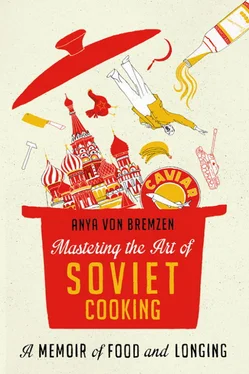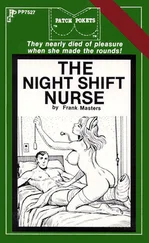I started my own collection of socialist fragments in 1974, weeks into our Philadelphia life. Mom instantly fell for Amerika . Me? Huddled on our bony refugee sofa I read Chekhov’s Three Sisters and whimpered along with the characters: “To Moscow… to Moscow.” My childhood fantasies of capitalist delicacies crashed against our first meal at the Robin Hood Diner. I choked on the cloying fluff of American coleslaw, stared in shock at the Day-Glo that is Velveeta. At home, while my mother gleefully slapped Oscar Mayer bologna onto alien Wonder Bread, I pined for the fragrant bricks of Moscow sourdough rye and the stale reek of cheapo Krakovskaya kolbasa. I’m pretty sure I’d lost my sense of taste those first Philadelphia months. Because depleted of political pathos, hospitality, that heroic aura of scarcity, food didn’t seem much of anything anymore.
Like a raggedy orphan, I paced our apartment, repeating to myself our sardonic Soviet defitsit (shortage) jokes. “Would you slice one hundred grams of kolbasa?” asks a man in a store. “Bring the kolbasa and we’ll slice,” answers the salesgirl. Or “Why are you emigrating?” “Coz I’m sick of celebrations,” says the Jew. “Bought toilet paper—celebration; bought kolbasa—more celebrating.”
In Philadelphia, no one celebrated Oscar Mayer bologna.
To revive my taste buds I began playing a game in my head. Picturing myself at a dacha (country cottage) surrounded by prickly gooseberry shrubs, I’d mentally preserve and pickle the tastes and smells of my Soviet socialist past in an imaginary three-liter jar of memory. In went the Order of Lenin Red October chocolate bars with a mirthful kid on the wrapper. In went the scarlet-wrapped Bolshevik Factory Jubilee Biscuits, the ones that dissolved so poignantly when dipped in tea from a yellow packet adorned with an elephant. In my mind’s eye I unwrapped the foil from the squishy rectangles of Friendship Cheese. Paused to dig an imaginary aluminum fork into the industrial breading of the six-kopek meat patties named after Stalin’s food supply commissar.
There was, however, an ideological cloud darkening my nostalgia exercise. The Friendship Cheese, the kolbasa, the chocolates—all were produced by the reviled Party-state we’d fled. Recalling Mom’s Proust recitations, I’ve come up with a phrase to describe them. Poisoned madeleines .
This is my “poisoned madeleine” memoir. It was my mother, my frequent co-conspirator in the kitchen and my conduit to our past, who suggested the means to convey this epic disjunction, this unruly collision of collectivist myths and personal antimyths. We would reconstruct every decade of Soviet history—from the prequel 1910s to the postscript present day—through the prism of food. Together, we’d embark on a yearlong journey unlike any other: eating and cooking our way through decade after decade of Soviet life, using her kitchen and dining room as a time machine and an incubator of memories. Memories of wartime rationing cards and grotesque shared kitchens in communal apartments. Of Lenin’s bloody grain requisitioning and Stalin’s table manners. Of Khrushchev’s kitchen debates and Gorbachev’s disastrous antialcohol policies. Of food as the focal point of our everyday lives, and—despite all the deprivations and shortages—of compulsive hospitality and poignant, improbable feasts.
PART I
FEASTS, FAMINES, FABLES

My maternal grandparents, Lisa and Naum Frumkin, circa 1929
CHAPTER ONE

1910s: THE LAST DAYS OF THE CZARS
My mother is expecting guests.
In just a few hours in this sweltering July heat wave, eight people will show up for an extravagant czarist-era dinner at her small Queens apartment. But her kitchen resembles a building site. Pots tower and teeter in the sink; the food processor and blender drone on in unison. In a shiny bowl on Mom’s green faux-granite counter, a porous blob of yeast dough seems weirdly alive. I’m pretty sure it’s breathing. Unfazed, Mother simultaneously blends, sautés, keeps an eye on Chris Matthews on MSNBC, and chatters away on her cordless phone. At this moment she suggests a plump modern-day elf, multitasking away in her orange Indian housedress.
Ever since I can remember, my mother has cooked like this, phone tucked under her chin. Of course, back in Brezhnev’s Moscow in the seventies when I was a kid, the idea of an “extravagant czarist dinner” would have provoked sardonic laughter. And the cord of our antediluvian black Soviet telefon was so traitorously twisted, I once tripped on it while carrying a platter of Mom’s lamb pilaf to the low three-legged table in the cluttered space where my parents did their living, sleeping, and entertaining.
Right now, as one of Mom’s ancient émigré friends fills her ear with cultural gossip, that pilaf episode returns to me in cinematic slow motion. Masses of yellow rice cascade onto our Armenian carpet. Biddy, my two-month-old puppy, greedily laps up every grain, her eyes and tongue swelling shockingly in an instant allergic reaction to lamb fat. I howl, fearing for Biddy’s life. My father berates Mom for her phone habits.
Mom managed to rescue the disaster with her usual flair, dotty and determined. By the time guests arrived—with an extra four non-sober comrades—she’d conjured up a tasty fantasia from two pounds of the proletarian wurst called sosiski . These she’d cut into petal-like shapes, splayed in a skillet, and fried up with eggs. Her creation landed at table under provocative blood-red squiggles of ketchup, that decadent capitalist condiment. For dessert: Mom’s equally spontaneous apple cake. “Guest-at-the-doorstep apple charlotte,” she dubbed it.
Guests! They never stopped crowding Mom’s doorstep, whether at our apartment in the center of Moscow or at the boxy immigrant dwelling in Philadelphia where she and I landed in 1974. Guests overrun her current home in New York, squatting for weeks, eating her out of the house, borrowing money and books. Every so often I Google “compulsive hospitality syndrome.” But there’s no cure. Not for Mom the old Russian adage “An uninvited guest is worse than an invading Tatar.” Her parents’ house was just like this, her sister’s even more so.
Tonight’s dinner, however, is different. It will mark our archival adieu to classic Russian cuisine. For such an important occasion Mom has agreed to keep the invitees to just eight after I slyly quoted a line from a Roman scholar and satirist: “The number of dinner guests should be more than the Graces and less than the Muses.” Mom’s quasi-religious respect for culture trumps even her passion for guests. Who is she to disagree with the ancients?
And so, on this diabolically torrid late afternoon in Queens, the two of us are sweating over a decadent feast set in the imagined 1910s—Russia’s Silver Age, artistically speaking. The evening will mark our hail and farewell to a grandiose decade of Moscow gastronomy. To a food culture that flourished at the start of the twentieth century and disappeared abruptly when the 1917 revolution transformed Russian cuisine and culture into Soviet cuisine and culture—the only version we knew.
Mom and I have not taken the occasion lightly.
The horseradish and lemon vodkas that I’ve been steeping for days are chilling in their cut-crystal carafes. The caviar glistens. We’ve even gone to the absurd trouble of brewing our own kvass, a folkloric beverage from fermented black bread that’s these days mostly just mass-produced fizz. Who knows? Besides communing with our ancestral stomachs, this might be our last chance on this culinary journey to eat really well .
Читать дальше














